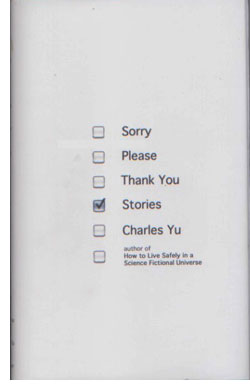 |
 Charles Yu
Charles Yu
Sorry Please Thank You: Stories
Pantheon / Random House
US Hardcover First Edition
ISBN 978-0-307-90717-2
Publication Date: 07-24-2012
240 Pages; $24.95
Date Reviewed: 07-30-2012
Reviewed by: Rick Kleffel © 2012
Index:
Science Fiction
Fantasy
General Fiction
In 'Sorry Please Thank You,' Charles Yu tells some utterly enthralling stories that seem quite unusual. Sure the subjects are a bit offbeat (a man who works for a company to which people can outsource unpleasant emotions, a letter to a self in an alternate universe), and the execution is occasionally unusual (an outline or a series of single-paragraph pages), but readers will in general find themselves in entertainingly familiar territory.
What makes these stories really quite unique is that Yu uses the written word and storytelling to do more than simply tell a story. The works in 'Sorry Please Thank You' use language to interrogate and calculate the limits of our identity. Each story is like an abacus of words. As we read, as we immerse ourselves in Yu's story-structures, the words channel our thoughts back into thought itself. The stories are a hoot to read; they're funny, touching and very weird. But they're also something very unique. They are not experiments in literature so much as they are using literature to enable the readers to perform experiments on their experience of identity, of self. That second layer of reading experience — on top of great stories filled with emotion and character — makes these stories particularly engaging.
The collection is divided into three sections (Sorry, Please, Thank You), with a coda (All of the Above). Each section includes a variety of stories. The book begins with "Standard Loneliness Package," about a man who works for a company that allows customers to outsource emotions they don't wish to feel to its workers. He soon finds himself with feelings of his own that could do with outsourcing. It sets a great tone for the works that follow. The language is sparse and restrained; it's very declarative. Yu uses that style create the weird backdrop with all its science fictional trappings and combine it with a powerful emotional foreground; and inverts them regularly. The result creates a sense of wonder intellectually as Wu explores the permutations of his concept, but also is deeply involving. The dissonance between the two effects is powerful enough to be a third force in the storytelling.
"First Person Shooter" is Yu's take on the zombie trope, as two bored workers on the graveyard shift in a mega-big box store deal with an undead customer. Like most of these stories, there's a sly, dark sense of humor at work here. "Troubleshooting" is a poignant story of regret framed by computer instruction manuals and self-help books. Here, Yu creates a vivid, emotional minefield and clever linguistic exploration of life and identity that works both as story and as a thought-provoking self-examination by language.
"Hero Absorbs Major Damage" is set in a videogame, where Yu's declarative prose is part of the world-building. "Human for Beginners" plays with relationships by way of instruction manuals, using the format and language of business to examine family. "Inventory," a story of emotional fragmentation, also works as both an interrogation of the reader's self-perception and a not-so-straightforward look at a breakup. In "Note to Self," Yu explores quantum fiction as he sets up a hall of narrative mirrors. It's funny and excitingly odd.
"Yeoman" is a tribute to the "red shirts" of Star Trek, the ensigns who were destined to die on an away team. "Designer Emotion 67," framed as a speech to shareholders, mines territory familiar to readers of Philip K. Dick and Stanislaw Lem with a nice new twist and Yu's pitch-perfect prose. With "The Book of Categories", Yu uses the MS Word Outline format in a devastating examination of grief. "Adult Contemporary" is a psychedelic examination of the stories we construct for ourselves, and the final story in the volume, "Sorry Please Thank You," speaks to what we have not done.
Throughout these stories, readers will find an impressive, stripped down prose style that is almost alarmingly easy to read as Yu slips through narrative knots that are charmingly complex. There's a liveliness to everything in here, emotional and intellectual that elicits the best aspect of science fiction — that "sense of wonder" — without ever resorting to the usual means of getting there. 'Sorry Please Thank You' is also handsomely designed. It makes a difference. Charles Yu is a precise writer. Every word matters as much as the figures in a sum, as the beads on an abacus. It all adds up to very much more than readers have a reason to expect — a genuinely new and engaging narrative voice, asking and answering the oldest questions.
|
 |




